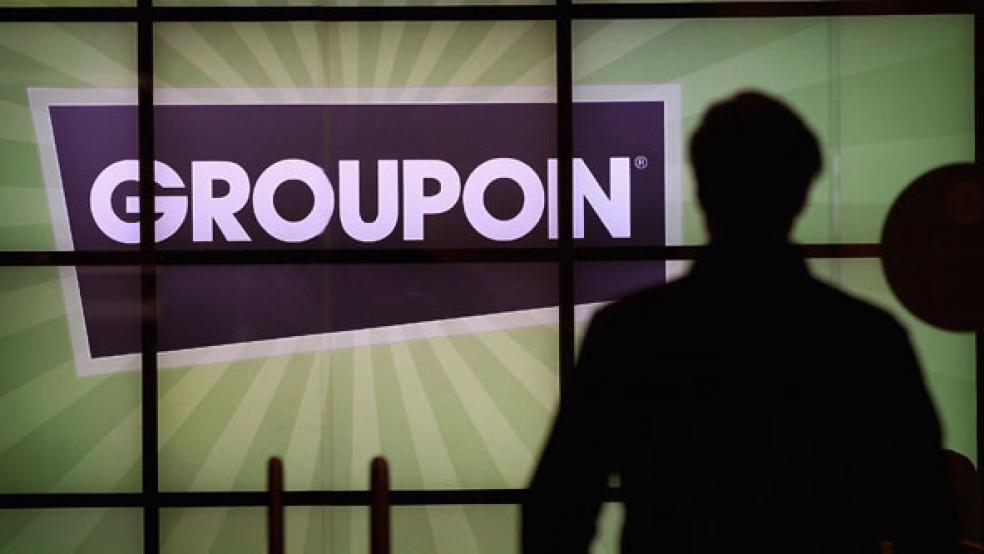Pity the poor Groupon (GRPN) investor. Anyone who got caught up in the hype surrounding the IPO of the daily deals company just a little more than a year ago and held on to his shares is now sitting on a loss of more than 80 percent. A recent rally in the company’s stock price, amidst reports that Groupon’s board would meet to discuss replacing thirtysomething CEO Andrew Mason, may have helped psychologically but it only put a tiny dent in the losses that virtually every current shareholder has experienced owning the stock over the last 12 months.

That board meeting last week ended with directors deciding not to make any change in the company’s leadership, a decision that has already contributed to fresh declines in Groupon’s stock price. It ended the week at only $4.14 a share, down 84 percent from its closing peak above $26 from November 2011.
It’s not likely that the board views Mason’s leadership through the same rose-colored glasses that he himself donned. At a New York conference last week, the CEO said that, “if I ever thought I wasn’t the right guy for the job, I’d be the first person to fire myself.” (Reality check: How many people are quite that honest with themselves? And how many CEOs are ever that honest in evaluating their own tenure? That’s why boards of directors exist in the first place….) But some on the board have reportedly been looking for Mason to be "more aggressive and public" about the company's turnaround efforts, as Kara Swisher at AllThingsD reported.
RELATED: Groupon Fights for Its Life as Daily Deals Fade
It is hardly surprising that Mason’s leadership came up for discussion at the board level, and I would have given a lot to be a fly on the wall during the no doubt heated conversation that took place. After all, if you founded a company, took it public, invested in it over the four years of its existence and then watched its stock price flounder, you’re going to want to hold someone responsible for the stock’s disastrous performance.
But the problem here goes well beyond Mason’s performance in the CEO role and extends into areas that are completely beyond the ability of any board of directors to control. And some of these involve lessons that we all should have learned more than a decade ago, after the dotcom bubble burst.
Let’s start with Groupon’s rapid rise as a brand new company in a brand new industry. While it isn’t a dotcom that went from being launched to being a publicly traded startup company within a mere 18 months, as happened in the final stages of the dotcom frenzy, it simply went public prematurely.
When a baby is born prematurely, the infant is placed in an incubator and shielded from the harsh external environment, provided with round-the-clock nursing care and precisely the kind of nourishment needed to help him develop his vital organs. In contrast, a newly public company is shoved into the market and forced to compete for capital and the attention of investors. It’s a Machiavellian/Darwinian kind of world, and there’s no oversight or guidance from the investment bankers once the IPO has been completed.
The CEO isn’t the only person responsible for a premature IPO. Indeed, it’s the board that signs off on that decision, and on the terms of an IPO in general. And it’s the board that is responsible for ensuring that it has a reasonable long-term view of the company’s strategy and business environment.
To the extent that Groupon’s post-IPO woes were foreseeable, directors should have considered them when deciding to go public, and adjusted their plans accordingly. To the extent that they weren’t, such as the departure of some key executives, the board members need to ask themselves with ruthless honesty whether those can be attributed to Mason. Were personality conflicts or poor management responsible for those departures, or poor judgment on Mason’s part responsible for its accounting problems? Did he foresee the risks that lay ahead but fail to disclose them honestly to the board? If the answer to the above is “no,” then it’s hard to make a case that Mason alone is responsible for the company’s plunge in share price.
Part of the problem, indeed, lies with irrational expectations on the part of both the company and its shareholders. For whatever reason, the dotcom debacle has failed to convince investors that it’s not possible to make a quick killing from a new business model. Too many speculators still believe that it’s OK to invest in a newish business run by a 30-something CEO in hopes of doubling their money. When investment bankers take an IPO candidate like Groupon on the road, they are counting on that kind of irrational exuberance to drive demand for the stock, citing intangibles like investor enthusiasm in their pitches to institutional investors. Exactly the same phenomenon was at work in Facebook’s (FB) IPO faceplant.
Groupon may be a really bad investment, even at its recent lows. But Mason is not the only culprit. The responsibility is more collective in nature. It extends to the company’s directors, its investment bankers (who whipped up demand for the IPO, as they pursued the underwriting fees and the league table credit) and to investors who were willing to pay $20 a share for stock in a company involved in an industry with very little track record and virtually no competitive “moat.”
Because the daily deals business sounded so convincing, because it looked like a new new thing and not just a plain old coupon business, because we all wanted to find some kind of growth in a slow-growth stock market, many of us put our sober second thoughts to one side. Once again, we were willing to believe that pots of gold lie at the end of rainbows. And once again we learned that’s rarely if ever true.






